Digital Poster
Advancing Quantitative Imaging for a Comprehensive Body Evaluation
ISMRM & ISMRT Annual Meeting & Exhibition • 10-15 May 2025 • Honolulu, Hawai'i

 |
Computer Number: 17
1674. Quantification
of fatty acid composition at 5.0T
C. Cheng, L. Ma, H. Zheng, X. Liu, C. Zou
Shenzhen institutes of advanced technology, Chinese Academy of Sciences, Shenzhen, China
Impact: This study demonstrates the accuracy and
feasibility of in vivo FAC quantification using a 5.0T MR
system, which promotes the further research on FAC in
diverse tissues at various physio-pathological states using
ultra-high field strength.
|
|
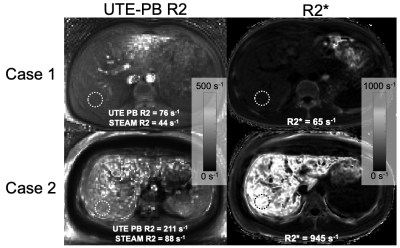 |
Computer Number: 18
1675. Ultra-Short
Echo Phase-Based R2 Mapping for Liver Iron Overload
D. Tamada, S. Reeder
University of Wisconsin-Madison, Madison, United States
Impact: UTE-PB R2 mapping enhances the quantification of
severe iron overload with improved SNR and dynamic range,
potentially improving the diagnosis of patients with iron
overload. Further research is needed to optimize and
validate PB R2 mapping for high R2 conditions.
|
|
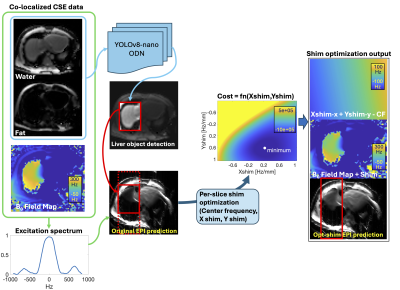 |
Computer Number: 19
1676. Diffusion
MRI of the liver with Optimized Slice-specific, Liver-specific
Shimming
A. Tollefson, G. Fullerton, P. Lan, A. Guidon, G. Wu, A.
Pirasteh, D. Hernando
University of Wisconsin-Madison, Madison, United States
Impact: DWI of the abdomen with reliable fat suppression
is demonstrated in challenging slices by optimizing for
liver regions when using a slice-specific shimming approach.
This combined method may enable improved detection and
staging of cancer in the abdomen.
|
|
 |
Computer Number: 20
1677. Quantitative
microstructural mapping based on time-dependent diffusion MRI
for predicting CEA levels in rectal cancer
Y. Li, X. Chen, X. Dong, S. Yi, M. Chen, P. Zhou
Sichuan Clinical Research Center for Cancer, Sichuan Cancer Hospital & Institute, Sichuan Cancer Center, Affiliated Cancer Hospital of University of Electronic Science and Technology of China, Chengdu, China
Impact: Microstructural parameters based on td-dMRI have
the potential to reflect elevated CEA levels, thereby
serving as predictors of the proliferative and metastatic
capabilities of rectal cancer.
|
|
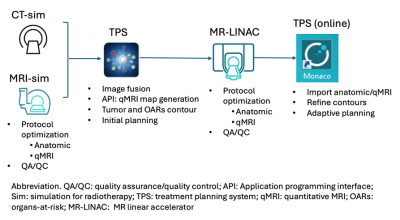 |
Computer Number: 21
1678. Establishing
a Quantitative MRI-Guided Adaptive Radiotherapy Program in
Radiation Oncology
J. Deng, Y. Dai, Y-p Liao, J. Wu, C. Kabat, J. De Vis, W.
Lu, Y. Yan, B. Cai, M-H Lin, A. Godley
University of Texas Southwestern Medical Center, Dallas, United States
Impact: Our project accelerates the integration of
qMRI-based biomarkers into clinical workflows involving MRI
simulation and MR-LINAC treatment, establishing a framework
for MR-guided Biology ART in clinical settings to achieve
personalized radiotherapy.
|
|
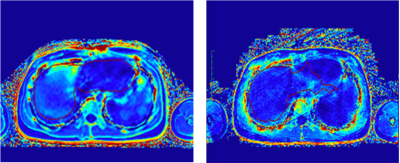 |
Computer Number: 22
1679. Comparison
of Breath-Hold and Free-Breathing Techniques for Fat Fraction
and R2* Quantification in the Liver
E. Stamou, J. Venkatesh, A. Mitchell, M. Reid, A. Amin, A.
Jones, P. Bridgen, R. Neji, C. Williamson
Guy's and St Thomas' NHS Foundation Trust, London, United Kingdom
Impact: This study demonstrates that both BH and FB
techniques effectively quantify liver fat and iron, with FB
offering higher SNR and reduced motion artefacts. However,
variability in R2*
values highlights the need for improved segmentation and
protocol refinement.
|
|
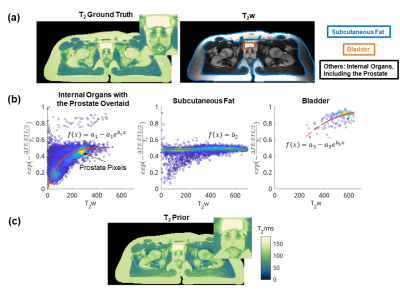 |
Computer Number: 23
1680. Enhanced
standardization of clinical T2-weighted prostate images: e-CAMP
with T2 prior
H. Zhang, H. Tagare, G. Galiana
Yale University, New Haven, United States
Impact: Sensitivity of machine learning to scanner-
and/or protocol- variability can be reduced by estimating T2 maps
from T2w.
Here we present the feasibility of this approach for
prostate imaging, where machine learning has shown great
promise.
|
|
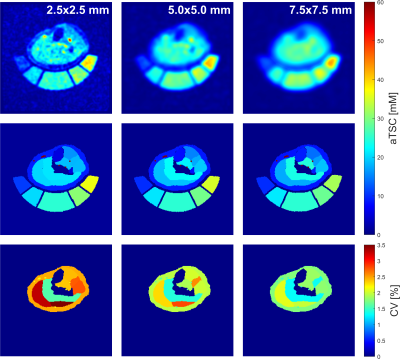 |
Computer Number: 24
1681. Accelerated
quantification of muscular tissue sodium concentrations at 7
Tesla
M. Höhn, T. Wilferth, L. Gast, T. Gerhalter, M. Uder, A.
Nagel
University Hospital Erlangen, Erlangen, Germany
Impact: Quantification of aTSC in the calf at reduced
resolutions is possible, which significantly shortens the
measurement time for clinical studies. However, when using
this method, small but significant deviations in the aTSC
values are to be expected.
|
|
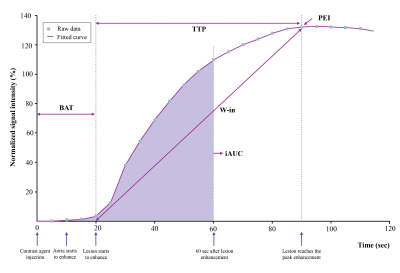 |
Computer Number: 25
1682. Multiple
Parameters from Ultrafast Dynamic Contrast-enhanced MRI to
Differentiate HER2-Zero, -Low, and -Positive Breast Cancer
Y. Cao, X. Wang, Y. Huang, H. Chen, T. Yin, J. Zhang
Chongqing University, Chongqing, China
Impact: This research demonstrates that UF-DCE MRI could
provide a non-invasive method for distinguishing HER2
expression levels in BC, aiding in selecting appropriate
therapies. It has the potential to improve personalized
treatment approaches and influence future clinical practice
in HER2-targeted therapies.
|
|
 |
Computer Number: 26
1683. Evaluating
Breast Lesions with Ultrafast DCE-MRI: The Impact of Temporal
Resolution on Pharmacokinetics
T. Xie, Y. Huang, C. Fu, R. Grimm, M. D. Nickel, Q. Xiao, R.
Li, W. Peng, Y. Gu
Fudan University Shanghai Cancer Center, Shanghai, China
Impact: This study advances breast cancer diagnosis by
validating the impact of temporal resolution on
pharmacokinetic parameters, promoting broader adaptations to
enhance accuracy in quantitative pharmacokinetic assessment
for cancer diagnosis and prognosis across institutions and
imaging modalities.
|
|
 |
Computer Number: 27
1684. Quantification
Assessment of fatty acid composition in Brown and White Adipose
Tissue of Healthy Individuals
M. Huo, D. Nickel, H. Qin
Department of Radiology, The Second Affiliated Hospital of Guangzhou University of Chinese Medicine, Guangzhou, China
Impact: The bipolar multi-echo MRI technique effectively
differentiates brown from white adipose tissue in
thermoneutral environments, advancing our understanding of
human brown adipose tissue biology and aiding future medical
applications.
|
|
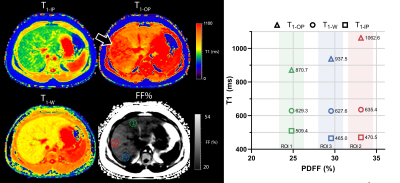 |
Computer Number: 28
1685. Simultaneous
Liver Water T1 and Fat Fraction Mapping using Chemical-Shift
Encoded Modified Look-Locker Inversion Recovery Imaging
J. Greer, P. Debnath, M. K. Manhard, A. Trout, J. Dillman,
A. Pednekar
Philips, Cincinnati, United States
Impact:
This study introduces a single breath-hold CSE MOLLI technique that simultaneously estimates water-specific T1 and fat fraction in the liver, showing strong correlations with established methods. This approach aids in differentiating the impacts of water and fat on liver health. |
|
 |
Computer Number: 29
1686. An
Optimized Dual-targeted Anti-angiogenic Therapy Strategy with
Regorafenib and Imatinib for Colorectal Cancer by
Multi-parametric MRI
L. Zhang, W. Mai, D. Zhang, C. Shi
the First Affiliated Hospital of Jinan University, Guangzhou , China
Impact: This study demonstrates that alternating
regorafenib and imatinib therapy enhances tumor response,
prolongs antitumor effects, and overcomes treatment
resistance, improving survival outcomes in CRC.
|
|
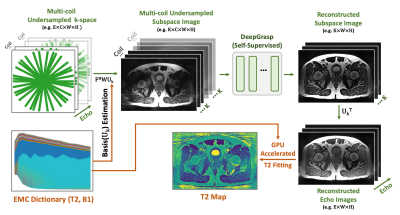 |
Computer Number: 30
1687. DeepGrasp-T2
Mapping: Accelerated T2 Mapping Combining Radial Acquisition,
Self-Supervised Deep Learning Reconstruction, and EMC Modeling
H. Pei, M. Keerthivasan, J. Quimbo, Y. Huang, F. Han, I.
Khodarahmi, A. Tong, H. Chandarana, L. Feng
New York University Grossman School of Medicine, New York, United States
Impact: This work proposed DeepGrasp-T2, a
self-supervised learning based approach that allows for
rapid and accurate T2 mapping without requiring reference
images for network training, offerring potential for
different clinical applications such as prostate T2 mapping.
|
|
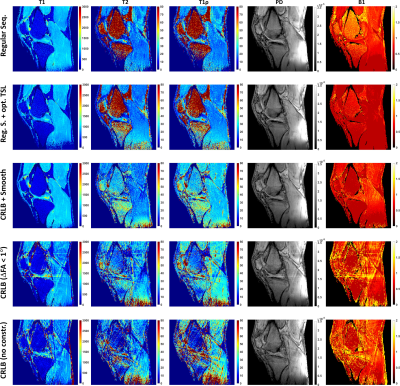 |
Computer Number: 31
1688. Optimization
of 3D MR Fingerprinting with Cramér-Rao Lower Bound and Smooth
Signal Evolutions for Efficient T1, T2, and T1ρ in the knee
joint
M. Zibetti, H. De Moura, A. Monga, R. Regatte
NYU Langone Health, New York, United States
Impact: This optimized 3D-MRF sequence can improve
quantitative mapping in the knee joint, with more
quantitative accuracy, due to CRLB optimization, and reduced
undersampling artifacts, due to smooth signal evolutions.
|
|
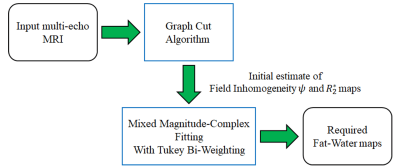 |
Computer Number: 32
1689. Fat-water
separation in low SNR MRI using Graph Cut and mixed
magnitude-complex re-fitting with Tukey's Bi-weighting
G. M, D. Kandasamy, R. Sharma, D. Shalimar, S. Anshal, R.
Dasgupta, A. Mehndiratta
Indian Institute of Technology - Delhi, New Delhi, India
Impact: The Proton-Density-Fat-Fraction maps obtained
from fat-water separation with ME-MR could be of diagnostic
and prognostic value in many diseases. This study proposes a
novel method for handling fat-water separation in
noise-prone single-shot ME-MR with large echo-spacing.
|
The International Society for Magnetic Resonance in Medicine is accredited by the Accreditation Council for Continuing Medical Education to provide continuing medical education for physicians.